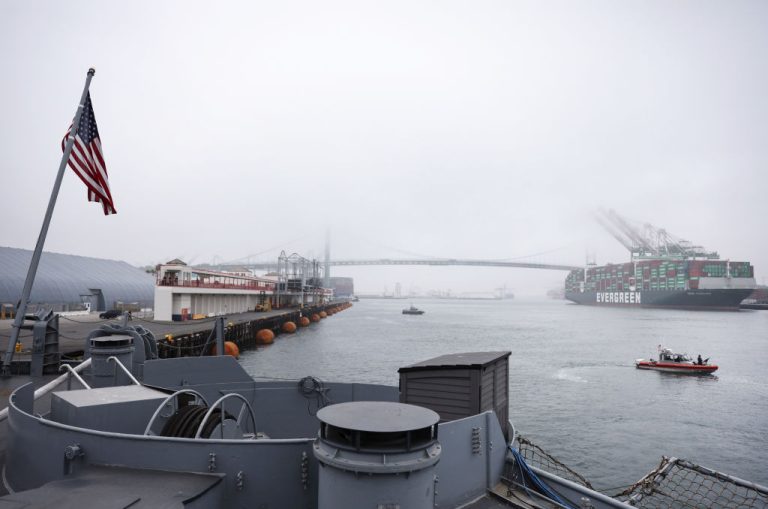Imports to the largest maritime shipping hub in America fell 16.8 percent year over year and almost the same month over month, confirming fears that both the United States and the world economy are entering a severe recession that may quickly escalate into a depression are anything but overblown.
The data was reported by shipping industry analyst firm Freightwaves in a Sept. 15 article, which noted that the Port of Los Angeles, described as “the highest-volume container gateway in America” suffered “the lowest import total in Los Angeles for any month since December.”
The data was exceptionally notable, the outlet stated, because December was mired by the notorious supply chain crisis.
Today, the figures simply seem to be a symptom of a greater macro-economic illness in the global and U.S. economies.
MORE ON THE STATE OF THE ECONOMY
- With Winter Looming, Germans are Panic Buying Electric Space Heaters
- Army Tells Soldiers to Use Food Stamps as Inflation Derails Middle Class
- Traders are Profiting $133 Million Per Shipment to Send US Natural Gas to Europe
In terms of August levels, imports fell 16.7 percent month over month, registering “the lowest import total in LA for the month of August since 2014, eight years ago, back when Barack Obama was president and Pharrell Williams’ ‘Happy’ topped the charts,” the article reads.
Success
You are now signed up for our newsletter
Success
Check your email to complete sign up
But according to the Port’s Executive Director, Gene Seroka, the gravity of the numbers in terms of how they reflect economic conditions may be somewhat misleading.
Seroka stated, “Some of the cargo that usually arrives in August for our fall and winter seasons is already here…Cargo owners who expected longer lead times shipped earlier in order to guarantee delivery schedules.”
“This just-in-case strategy versus the traditional just-in-time approach has been widespread in the market,” he added.
And Seroka’s analysis may be accurate. In June, U.S. retail giants such as Amazon and Best Buy all reported sitting on a massive glut of inventory, a problem considering that sales demand was either flat or barely on the rise.
The problem is that in light of the late 2021 and early 2022 supply chain crisis, corporate buyers were forced to order larger quantities of product, and far in advance of schedule, in order to ensure their firms could maintain supply to meet demand in the event of worst-case transportation delay scenarios.
But nonetheless, Seroka’s further comments did reveal economic weakness abounds when he stated, “Consumers are naturally getting a bit anxious, as are retailers. We’re starting to see canceled production orders out of Asia.”
Freightwaves notes, however, that LA’s supply chain woes have turned into a boon for the Port of Savannah in Georgia, which posted its best August in history — up 18.5 percent year over year, according to a Sept. 13 article.
The firm noted that shippers had transferred a great deal of volume both to the Savannah and neighboring Long Beach ports in order to hedge against labor disruptions in Los Angeles.
Seroka noted, however, “But to keep things in perspective, even with this projected softer volume in the back half of the year, the Port of Los Angeles is headed toward the second busiest year in our history.”
The shipping industry is certainly a useful one for keeping the pulse of the global economy.
On Sept. 16, international courier giant FedEx shocked the markets when it issued a withdrawal of its earnings forecast in a warning to investors during its quarterly earnings call, citing chronic weakness in the Asian markets and major problems emerging in Europe’s economies, Bloomberg reported.
The missive was so significant that the company’s stock lost almost 22 percent of its value, wiping out two years of gains in a single day, closing at $161.02 compared to $204.87 a day earlier.
FedEx dinged a low of $155.00 within the first few minutes of the opening bell.
“The company will take immediate steps to cut costs, including parking some aircraft, cutting workers’ hours and closing more than 90 of its roughly 2,200 FedEx Office locations,” Bloomberg stated.
For FedEx, although overall earnings only barely missed the mark by 1.72 percent at $23.2 billion actual versus $23.6 billion estimated, earnings per share was a total 33.1 percent airball, posting $3.44 per share opposed to $5.14 estimated.
In a second article on the topic, Bloomberg, citing analysts from Deutsche Bank, clarified just how significant the blow was.
“FedEx preannounced last night the weakest set of results we’ve seen relative to expectations in our ~20 years of analyzing companies,” the bank stated in a note to clients.
Analyst with Swissquote, Ipek Ozkardeskaya, told the outlet, “The FedEx warning came as a slap. It’s a solid sign that the economy started slowing.”
“This is certainly the first in a series of warnings that we may see for the quarters to come,” the analyst added.















